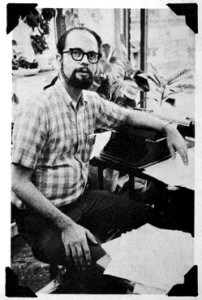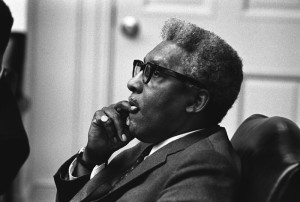Two Unforgettable Profiles In Courage: 1969
The first “favorable” articles I ever read about homosexuality and bisexuality were in WIN Magazine, a radical pacifist journal, in its “gay liberation issue” of November 15, 1969. (“Gay liberation” was a brand-new coinage then.)
I still remember how the “coming out” (yet another new phrase for me) story of and by David McReynolds, who was then the main staff member of the War Resisters League {WRL}, hit me like a series of physical blows.

I was a typically straight, reflexively homophobic young Sixties lefty. But I was also a committed supporter of WRL, its nonviolence, and hence of McReynolds, whose writings I read frequently, but whom I hadn’t yet met.
Paragraph by paragraph the piece, “Notes for a More Coherent Article,” knocked off chunks of my conventional outlook like pieces of a statue falling to a sledgehammer. The article was also an object lesson in a kind of costly personal courage that was far beyond the bravado flaunted by my ilk at the barricades
“It is hard to write this,” David affirmed. “It has become a three-Miltown-a-day article.” (Miltowns were an early “miracle” tranquilizer drug, that was eventually shown to be addictive and dangerous.)
A young draft resister who visited David when he was working on it remembered that David “worked late into every night, writing until two or three A.M. . .; he was also drinking heavily, arriving at the [WRL] office each day around noon, terribly hung over.”

David’s agonizing in print articulated a meme that’s now almost a cliche, but was one of the earliest of the now-familiar genre.
David remembers and reflects on that 1969 article and what it represents in what has just been published as the “Very Last Issue” of WIN Magazine. (As an old-timer, indeed once a WIN staff member, my copy arrived in that luxuriously antique medium of paper.)
I put “Very Last Issue” in quotes because this is WIN’s third incarnation (or third-and-a-half, if one wants to get arcane). I attended at least one of the earlier funerals. So who knows what zombie or angelic resurrected form the future might hold for it?
You can read the issue here.

“I never even liked the term ‘gay,'” David writes, “as I didn’t, in my experience, find that much about it that was gay. It was a neurotic world, filled with guilt, too much alcoholism, and centered around youth. After 40, one truly entered the dark ages.
“Nor am I clear why I wrote the article, what drove me to ‘come out in print’ with one of the very first such articles. While I was certainly influenced by the Stonewall riots, the Stonewall kids were not my crowd.
I had tried to go to Stonewall once, some time before the riots, but was turned away at the door. Too old? Too straight? It was a gathering place for young cross-dressing fellows—frankly the last people from whom I would expect a revolution. (But looking back, all power to them!)”
So, why write it? David agonized some more.
“Readers of WIN know that civil rights and peace icon [and Quaker] Bayard Rustin spent much of his life worrying that his arrest on a morals charge in Pasadena in 1953 would destroy his value to the movement. But it was not just Bayard who suffered. . . . I was then descending into the personal darkness of alcoholism. Perhaps one part of me thought such an article would gain me some attention.
But that is not really fair — Bayard taught me that all of us act from mixed motives. I think the key reason was that I was tired of living a lie. I had visited Bayard in jail after his Pasadena arrest (he was utterly broken by the arrest) and when he got out had him down to my beach shack in Ocean Park for dinner. As I drove him there, I said that one of the reasons I admired him so deeply was that he was the only man I knew who was aware that half of what he said was a lie.
I didn’t mean just the things which, on reflection, are obvious. If you were sheltering Jews in your basement in Germany, and a Gestapo officer asked if you were hiding Jews, you would certainly violate the principle of absolute honesty by saying no. (As Bayard pointed out, “moral absolutes, in the real world, can conflict,” a point Bertolt Brecht — himself no stranger to homosexuality — would have appreciated).

No, what I meant was that those of us who were homosexual hid this fact when we spoke of the Gandhian principle of absolute truth. Yes, truth and honesty about everything … except our own lives, which were in violation of the laws, and about which we had to keep silent in order to speak the truth about war and peace, racism, capitalism. Truth about everything… except the one thing that could destroy us.
My article was an effort to be honest at last.”
David’s full reflection is here.
I‘ve also searched out an internet scan of the original 1969 article, and I’ll link to it in a moment. But I need to turn to the other article from the issue that was almost equally striking.
It was by Paul Goodman, then a well-known novelist, poet, social theorist and critic. Goodman was one of the intellectual godfathers of the Sixties (yes, intellectual), whose book Growing Up Absurd has been hailed by many as a classic.
He was also, as he disclosed here, an active bisexual. His article, which was the cover story of the issue, was titled “My homosexual needs have made me a [censored– cultural and linguistic fashions prohibit publishing the final word of the title. Indeed, neither the article nor the author are mentioned in the last WIN issue. But Goodman’s article can be read here.]

(Here is the cover, with the forbidden term concealed. The image is more visible at the link to the text.)
Unlike McReynolds, Goodman was “shameless”:
“I have been fired three times because of my queer behavior or my claim to the right to it, and these are the only times I have been fired. I was fired from the University of Chicago during the early years of Robert Hutchins; from Manumit School, an off-shoot of A. J. Muste’s Brookwood Labor College; and from Black Mountain College. These were highly liberal and progressive institutions, and two of them prided themselves on being communities.
Frankly, my experience of radical community is that it does not tolerate my freedom. Nevertheless, I am all for community because it is a human thing, only I seem doomed to be left out. . . .

But there is a positive side. In my observation and experience, queer life has some remarkable political values. It can be profoundly democratizing, throwing together every class and group more than heterosexuality does. Its promiscuity can be a beautiful thing (but be prudent about V.D.)
I have cruised rich, poor, middle class, and petit bourgeois; black, white, yellow, and brown; scholars, jocks, Gentlemanly (‘s, and dropouts; farmers, seamen, railroad men, heavy industry, light manufacturing, communications, business, and finance; civilians, soldiers and sailors, and once or twice cops …
There is a kind of political meaning, I guess, in the fact that there are so many types of attractive human being . . . .”
Goodman’s piece was absorbing, and is even more provocative now, but McReynolds’ piece had more impact for me. Both took guts.
Goodman died in 1972. David McReynolds is still doing his bit to overthrow capitalism and militarism, and enjoy life, at 85. I salute his courage, and the magazine which made it both possible and necessary.
Postscript:
I can’t resist the opportunity to reprint one of Paul Goodman’s best-known poems here:
“The Lordly Hudson”
“Driver, what stream is it?” I asked, well knowing
it was our lordly Hudson hardly flowing.
“It is our lordly Hudson hardly flowing,”
he said, under the green-grown cliffs.”
Be still, heart! No one needs
your passionate suffrage to select this glory,
this is our lordly Hudson hardly flowing
under the green-grown cliffs.
“Driver, has this a peer in Europe or the East?”
“No, no!” he said. Home! Home!
Be quiet, heart! This is our lordly Hudson
and has no peer in Europe or the east.
This is our lordly Hudson hardly flowing
under the green-grown cliffs
and has no peer in Europe or the East.
Be quiet, heart! Home! Home!
– Paul Goodman
